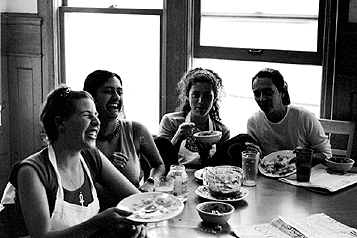








 There isn't a Campus Dining Services (CDS) hall where Maggie Terry hasn't worked. Beginning with Dascomb, Stevenson, Lord-Saunders, Talcott, andthe Rat, Terry, who is currently a food services supervisor, named off all the places she's flipped hamburgers and checked lines. "I've been here for all the changes before," Terry said, looking back over more than thirty years of employment at Oberlin.
There isn't a Campus Dining Services (CDS) hall where Maggie Terry hasn't worked. Beginning with Dascomb, Stevenson, Lord-Saunders, Talcott, andthe Rat, Terry, who is currently a food services supervisor, named off all the places she's flipped hamburgers and checked lines. "I've been here for all the changes before," Terry said, looking back over more than thirty years of employment at Oberlin.
If or when new changes are implemented in campus food services, Terry will be here to witness them as well. As a line-checker in Lord-Saunders, she was responsible for distributing some of the surveys in early April as part of Residential Life's initial efforts to find out what changes students might like to see in their dining hall and meal plan options.
"I told my kids to say what they would like to see," Terry said. "They're always telling me they've missed breakfast or missed lunch," she said, and this was their chance to speak out about it.
According to Sandra Hougland, manager of Housing and Dining, between 700 and 800 students participated in the survey--more than Residential Life originally anticipated.
"We were delighted that we got such a good response," Hougland said. Yet, she also said the quantity of surveys to process has also made tabulating the results more time-consuming.
Assistant Director of Residential Life Michele Gross, who is overseeing the processing of the surveys, echoed Hougland. "We're suffering from a wonderful dilemma," she said. "It's taking us longer because we got more responses than anticipated."
Gross also said the process has taken longer because of the timing of surveys near the end of the year, when both Residential Life and the students who are assisting in the initial computer data entry are especially busy. Despite this, she anticipates the inputting of the data will be finished by Sunday.
After this initial tabulation, "it will probably take a couple of weeks to analyze the results," Gross said. Furthermore, "any kind of real organized analysis probably won't come out until after students have left for the year," she added.
In the meantime, Terry--as well as other food service employees, Residential Life representatives, OSCA representatives, and other students--are eagerly waiting to see what the surveys show.
"We'll accommodate those kids with anything they want," Terry said. She recalled one past student who expressed dissatisfaction with the food in Lord-Saunders and who brought in a recipe from home that the cooks went on to prepare. "We have to figure out how to make you guys happy," she said. "This is what the whole system is--what my job consists of."
CDS Director David Jensen similarly said that any future changes will be customer-driven. In particular, he said he would like to see changes that satisfy both students and employees, within feasible costs.
 OSCA President senior Jennifer Carter said, "We're waiting for the surveys, too." According to Carter, she and other OSCA leaders have been concerned about what any changes might mean for OSCA's meal options in particular. As a result, they have already had several discussions.
OSCA President senior Jennifer Carter said, "We're waiting for the surveys, too." According to Carter, she and other OSCA leaders have been concerned about what any changes might mean for OSCA's meal options in particular. As a result, they have already had several discussions.
Carter said that, while she doesn't think it will amount to a large number of people, it is conceivable that Co-ops might lose some of their diners if changes occur in the current meal plan system. Even though OSCA would still be cheaper, the lower cost of CDS under new partial meal plan options might make some students choose CDS who might otherwise have chosen OSCA, she said.
"As a student, I'm definitely in support of having more options," Carter said. Furthermore, "if people want partial meal plans, then [Co-ops] want to do that too," she said.
Yet, for Co-ops, options such as partial meal plans might be difficult to coordinate, according to Carter. "How do you monitor partial meal plans in a Co-op?" she asked, citing the lack of line checkers and the consequent difficulty in monitoring who eats when. She also said discussions would have to take place regarding the determination of Co-op members' required work contributions, in light of both full or partial meal plans.
"I think it will take a lot of trial and error on OSCA's part to find a system that works," said Carter.
In any case, Carter said she anticipates OSCA representatives will be very involved in planning any future changes once Residential Life begins discussions--just as OSCA representatives were involved in formulating some of the questions in Residential Life's month-old surveys.
As the fact sheet given to students a month ago along with these surveys outlined, co-ops are an important factor in the way the current dining system works as a whole. Any changes to meal plans or facilities that do occur in the future will be the result of a new financial balance that takes both Oberlin's unique circumstances and student survey results into account.
"If they want to cut the meal count down," Terry said, "they might have to close certain facilities." She recalled talk of closing Lord-Saunders in years past. Yet, if Lord-Saunders were closed in the near future, Terry said she would simply have to adjust. "Okay, I'll move to Stevenson," she said.
"For me, I've been working here thirty years and any changes there are, we'll just have to deal with them," Terry said.
Unlike Terry, Stevenson line checker Judy Wigert is a relative newcomer to CDS. "I don't see why they need as many different dining places as they have," she said, "but I've only been here a little over a year."
In that year as a line checker, however, Wigert has gained an understanding of the students who come through her hallway. "I know that it's hard for you young people cause it's not mother's cooking," she joked, "but I think they do a pretty good job."
Yet, in regard to the current 21-meal option, Wigert said, "It's hard because a lot of people only eat two meals a day and pay for three. That's one thing I can't understand." Also, "If you want to live off campus, why can't you choose where you want to eat? A lot of people who come here are not from wealthy families."
Both Terry and Wigert said the most significant changes for CDS employees will most likely affect the cooks. Terry said discussions have already taken place in which employees were told that "we've got to start enhancing meals more than we really have."
Terry said she doesn't expect any drastic changes of the sort which would make people upset.
Jensen agreed with this, saying, "any changes shouldn't upset people. Much thought will be given to making any change a win-win for the student, employees, and the College." Jensen went on to say that he anticipates "only a positive impact on employees--mainly by improving the working environment and possibly the equipment used."
 According to Gross, while some small-scale changes might be in place by next fall, Residential Life's initial plans were for a more long-term two year analysis. Discussions for more large-scale changes will begin when students return in the fall.
According to Gross, while some small-scale changes might be in place by next fall, Residential Life's initial plans were for a more long-term two year analysis. Discussions for more large-scale changes will begin when students return in the fall.
Until the results of the surveys are completed, Gross said it is difficult to foresee the parameters within which Residential Life will have to work. In general, she said, "It will be a challenge to meet as many priorities as possible and in the funds available."
While she has only looked through student comments on a "hit-or-miss" basis so far, Gross said many students appear to have offered written comments. Furthermore, she said the comments "don't seem to be frivolous answers." Rather, they appear to be "really thoughtful responses."
"I'm hoping that we get some strong direction from [the student surveys]," Hougland said. "That's what we really want."
If or when organized analysis begins to yield to tangible changes, Terry and other campus food service employees will be there to implement them.
Although Gross said some small-scale changes may be in place for the fall semester, she said the bulk of any possible changes will take place sometime down the road, after discussions beginning when students return in the fall.
(top) Dinner and a movie?: When students need a rest from CDS or the coop dining options, Campus Restaurant in one possibility. Atmospherewise, anything beats CDS. (photo by Zach Fried)
(bottom two) Tastes great, less filling: Students can eat at coops such as Tank or in the dining halls, such as Stevenson. Students often complain of the inflexibility of the 21-meal plan, the only option available to the majority of students, who can't get off-board. (photos by Zach Fried)

Copyright © 1997, The Oberlin Review.
Volume 125, Number 23, May 2, 1997
Contact Review webmaster with suggestions or comments at ocreview@www.oberlin.edu.
Contact Review editorial staff at oreview@oberlin.edu.